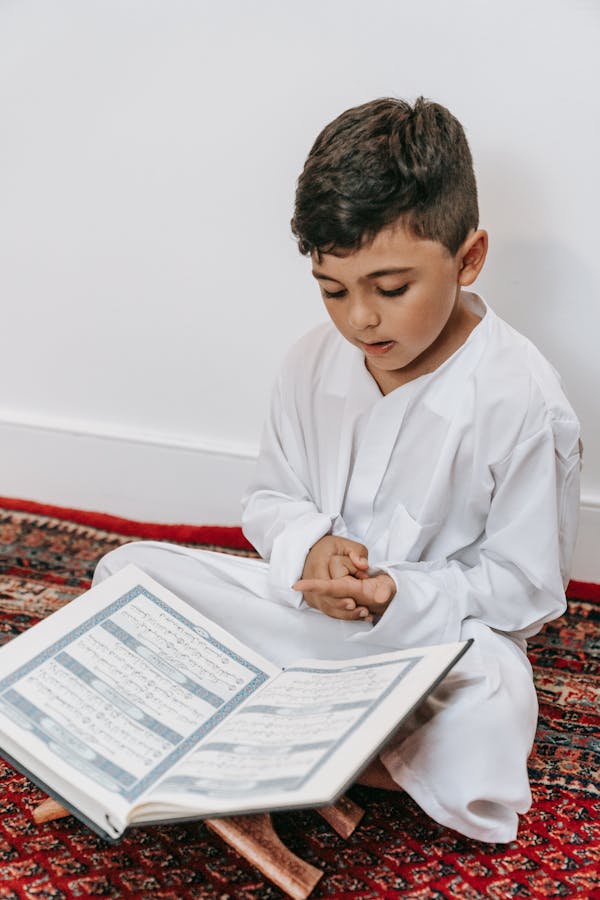Have you ever watched a young child learn something for the first time? Their eyes light up, their minds absorb like a sponge, and they often remember lessons for a lifetime. Now imagine if one of those early lessons included values like honesty, respect, kindness, and gratitude, core principles of Islamic Studies for Kids.
Starting Islamic education early isn’t just about learning duas and stories from the Quran; it’s also about instilling a sense of purpose and a deeper understanding of the faith. It’s about planting seeds of faith, identity, and purpose in a child’s heart. In today’s digital age, the rise of online Islamic studies for kids has made access to this knowledge easier than ever. Let’s take a deep dive into why Islamic studies online for kids is not only necessary but essential for building a strong foundation in both faith and character.
Table of Contents
The Foundation of Faith Starts Early
The early years of a child’s life are critical for learning. Just like a tree needs strong roots to grow, a child needs a solid foundation in faith. Teaching Islamic Studies For Kids from a young age helps them understand the basics of Islam who Allah is, why we pray, and what it means to be Muslim. It becomes a natural part of their daily thinking and behaviour. Children are naturally curious, and when we nurture that curiosity with answers rooted in Islamic teachings, it creates a meaningful connection with their religion that lasts a lifetime.
Building Strong Islamic Identity
In today’s globalised world, kids are exposed to various cultures, values, and lifestyles. Without a strong sense of identity, they can easily feel lost or confused. Islamic Studies for Kids Online helps children build a confident Muslim identity by teaching them who they are in the eyes of Allah and how Islam is a complete way of life. When children learn about Islamic heroes, practices, and community values, they develop a strong connection to their faith and fellow Muslims. This identity gives them the strength to stay true to their values, even in challenging environments.
Instilling Moral Values Through Islamic Teachings
Islam is not just a religion; it’s a guide for living with purpose and goodness. When children learn about Islam, they also learn about being kind, telling the truth, helping others, and respecting elders. These values are part of the teachings of the Quran and the Prophet Muhammad (PBUH). By utilising online Islamic studies for kids, parents can make these lessons more engaging through the use of videos, stories, and activities. The earlier children learn these morals, the more likely they are to carry them into adulthood, shaping them into honest and responsible people.
Why Early Education Shapes Lifelong Beliefs
The beliefs and habits children form in their early years often stay with them for life. Just as learning to brush your teeth or say “thank you” becomes second nature, learning Islamic values early on also becomes second nature. Islamic Studies for Kids helps form these habits, like saying Bismillah before eating or praying before bed. When Islamic knowledge is a part of daily life from a young age, kids don’t see it as a burden, but as something they love and understand. It creates a deep sense of faith that guides them through every stage of life.
Role of Quran and Hadith in a Child’s Development
The Quran and Hadith are rich sources of wisdom and guidance. When children are introduced to stories from these sacred texts, they don’t just memorise facts, they learn life lessons. Stories like that of Prophet Yusuf teach about patience, while Prophet Musa’s courage teaches bravery. These narratives foster emotional intelligence, problem-solving skills, and empathy. Through Islamic studies online for kids, these stories are brought to life through colourful illustrations, audio storytelling, and child-friendly language, making it easier for kids to connect with and remember the teachings.

How Islamic Stories Build Emotional Intelligence
Children often understand complex ideas through simple stories. Islamic stories are filled with moments that teach children how to manage emotions such as sadness, fear, and joy. When they hear about Prophet Yunus in the belly of the whale or the compassion of Prophet Muhammad (PBUH) toward animals and children, they learn to manage their feelings and respond with kindness. Platforms offering Islamic studies for kids online often utilise these stories in interactive ways, such as quizzes, role-playing games, or animated videos, making learning not only fun but also emotionally enriching.
The Convenience of Online Islamic Studies for Kids
Life can be hectic. Parents may not always have time to teach or drive kids to weekend Islamic schools. This is where online Islamic studies for kids come to the rescue. These programs enable kids to learn at any time, from anywhere. Whether it’s after school, on weekends, or during travel, all you need is an internet connection. Many platforms offer flexible schedules, which makes it easier for families to stay consistent with Islamic education while juggling other responsibilities.
What Makes Islamic Studies for Kids Online So Effective?
Modern technology meets timeless wisdom. That’s the magic of Islamic studies online for kids. These programs are carefully designed with the child’s learning style in mind. From colourful animations and storytelling to games and quizzes, they keep children engaged while they learn about their faith. Progress tracking, certificates, and interactive feedback help motivate kids to continue learning. Many platforms also offer live sessions with qualified teachers, enabling real-time questions and a deeper understanding.
Encouraging Love for Prayer and Worship
Salah (prayer) is the cornerstone of a Muslim’s life. But for kids, it can sometimes feel like a chore unless we introduce it with love and meaning. Islamic Studies For Kids teaches children the beauty behind prayer, how it connects us with Allah, brings peace to the heart, and helps us during hard times. Using fun reminders, songs, and short videos, Islamic studies for kids online encourages children to look forward to prayer, making it a cherished habit rather than a forced duty.
Developing Social Responsibility through Islamic Values
Islam is a religion of community and compassion. Through lessons about Zakat, caring for neighbours, helping the poor, and being just in dealings, children learn that they have a responsibility to others. These values are best taught through daily examples and real-life stories. When children participate in small acts of charity or learn about Islamic role models, they start to see themselves as part of something bigger. Online Islamic studies for kids often include activities that encourage giving, sharing, and community involvement.
Balancing Modern Education with Faith
Many parents worry that with school, homework, and extracurricular activities, there is little time left for Islamic learning. But faith doesn’t have to compete with academics; it can complement them. Islam encourages the pursuit of knowledge and excellence in every field. Programs that offer Islamic studies for kids online fit seamlessly into modern schedules, ensuring that children grow both academically and spiritually. This balance helps kids understand that they don’t need to choose between being successful and being faithful they can be both.
Parental Role in Islamic Education
Parents are the anchors of a child’s faith journey. Kids observe what parents do more than what they say. When parents engage in Islamic learning, pray regularly, and show kindness, kids naturally follow. While online Islamic studies for kids provide excellent tools and resources, nothing replaces the influence of a parent’s example. Sitting with your child during lessons, asking them what they learned, and encouraging practice at home deepens their understanding and makes learning more meaningful.
Tips for Choosing the Right Islamic Studies Program
Not all online programs are the same. When selecting an Islamic studies online platform for kids, look for qualified teachers with experience in child education. Verify that the content is age-appropriate, interactive, and grounded in authentic Islamic sources. Reading reviews, exploring sample lessons, and even sitting in on a trial class can help you decide. Choose programs that encourage critical thinking and love for Islam, not just memorization. A good program will inspire curiosity, not fear.
Fun and Interactive Learning in Islamic Studies
Learning doesn’t have to be boring. The best Islamic studies programs for kids online utilise engaging methods, including storytelling, games, songs, and even virtual rewards. When kids enjoy learning, they are more likely to stick with it and remember what they’ve learned. Many platforms use characters, avatars, or missions to teach lessons, which makes the experience feel like a game. This approach turns Islamic education into an exciting adventure rather than a routine task.
Conclusion:
We all want our children to grow into kind, confident, and spiritually grounded individuals. Early Islamic education gives them the tools to do just that. Whether through in-person classes or online Islamic studies for kids, the goal is to plant firm roots of faith, identity, and values. By combining technology with traditional teachings, we’re not just teaching Islam, we’re preparing our children to live it, love it, and lead with it. InshaAllah, these efforts today will create tomorrow’s wise and compassionate Muslim leaders.
Frequently Asked Questions (FAQs)
1. At what age should children start Islamic Studies?
Children can start learning basic concepts around the age of 3-5 through simple stories, duas, and manners. Earlier exposure helps with lifelong retention.
2. Are online Islamic studies for kids adequate?
Yes, especially when they use engaging tools like videos, quizzes, and storytelling. They are flexible, interactive, and designed for young learners.
3. What topics are covered in Islamic Studies for kids?
Topics include Quranic stories, Hadith, manners, salah (prayer), fasting, Islamic history, and core beliefs such as Tawheed.
4. How can I make Islamic learning fun for my child?
Use games, cartoons, rewards, and storytelling to engage your child. Platforms offering Islamic studies for kids online often seamlessly blend fun with education.
5. Is it necessary to hire a teacher for online Islamic studies?
While self-paced programs work well, a qualified teacher can guide, answer questions, and personalize the experience for deeper understanding.















